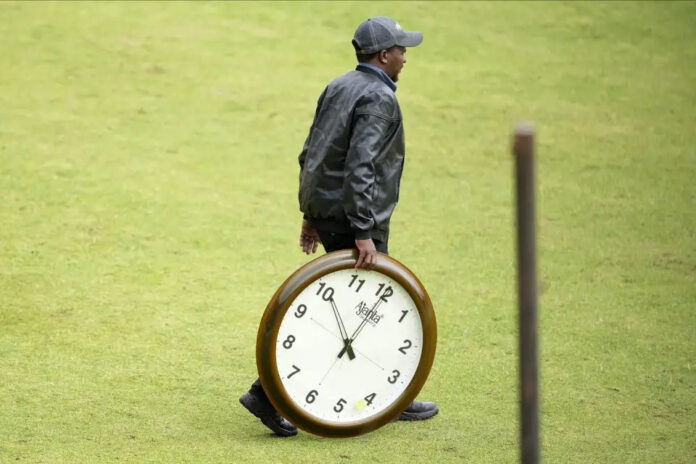NEW DELHI, Mar 15
The stop clock to help speed up over rates will become a permanent feature in men’s ODIs and T20Is between Full Members from June 1, the ICC announced after its board meetings in Dubai this week.
According to the rule, which has been trialled in international cricket since December last year, the fielding side must be ready to start an over within a minute of the previous one ending. If they fail to do so, they will be allowed two warnings by the umpires, after which a five-run penalty will be imposed for the third offence and every subsequent one.
“The results of the stop-clock trial were presented to the Chief Executives’ Committee (CEC), which demonstrated that around 20 minutes per ODI match had been saved in time,” an ICC said in a statement laying out the reasons for making the rule permanent. During the trial period, no team was found to have exceeded the one-minute limit between overs three times in an innings, and so the five-run penalty has not yet been imposed for this offence. In addition to the stop clock, there are two other penalties that can be imposed to police over-rates in limited-overs cricket – a fielding penalty and monetary fines. The fielding penalty is laid out as follows: if the fielding side fails to begin the final over of the innings by the stipulated cut-off time, after accounting for delays, they will have to bring an extra fielder into the 30-yard circle for however many overs are remaining in the innings. So they will be allowed only four fielders outside the circle, instead of five, for the duration of the penalty. This rule, introduced in early 2022, applies to both men’s and women’s limited-overs games.
The monetary fine includes a 5% cut in the team’s match fee for every over they are short of the minimum required over rate, after the umpires have taken into account allowances for unavoidable delays. The fine for the captain is double that of his team-mates, and the fines are capped at 50% of the match fee. 2024 T20 World Cup: 10 overs minimum for knockout games The 2024 T20 World Cup in the USA and West Indies in June will have reserve days in place for the semi-finals and final, in case of delays and interruptions. And each of those knockout games will require a minimum of 10 overs per innings to constitute a completed game. For the group stages, the minimum requirement remains five-overs-per-side to constitute a match, as is the norm for T20 cricket. 2026 T20 World Cup qualification at stake in 2024 edition The 2026 Men’s T20 World Cup, like the upcoming edition, will comprise 20 teams, with 12 automatic qualifiers: the two hosts India and Sri Lanka as well as the other teams that make the Super Eights at the 2024 T20 World Cup. Then, two to four teams (it will be fewer than four if India or Sri Lanka finish outside the top eight in 2024) are decided by who are the next highest-ranked teams in the ICC’s T20I rankings on June 30, 2024. The remaining eight spots for 2026 will be decided through the usual regional qualifiers pathway.



























